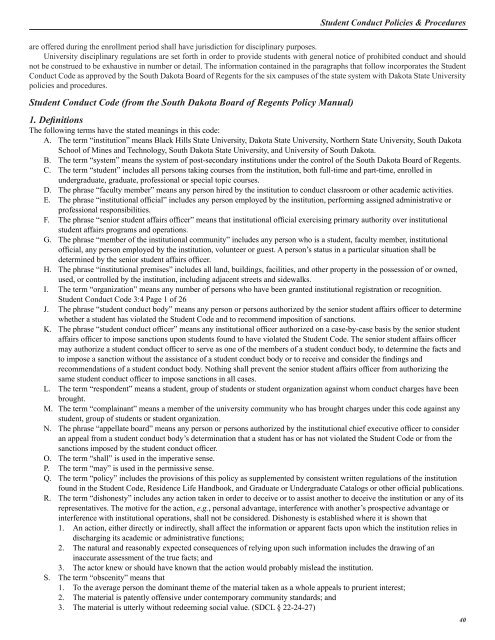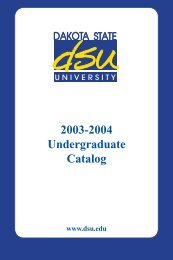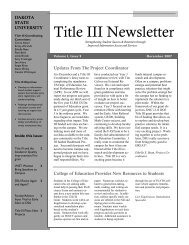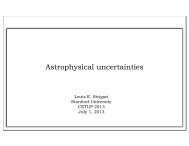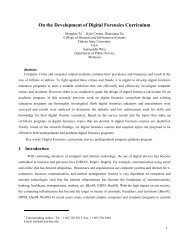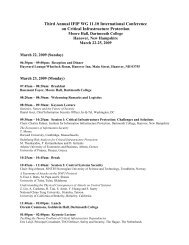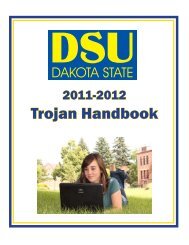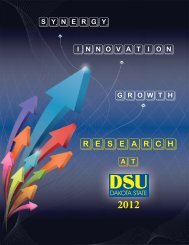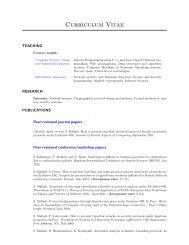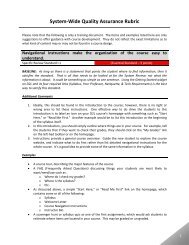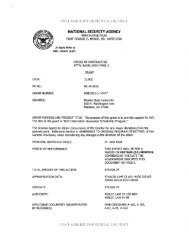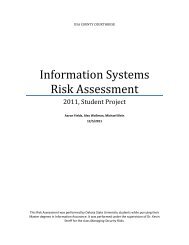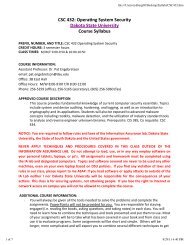Academic Calendar – Fall 2012 - Dakota State University
Academic Calendar – Fall 2012 - Dakota State University
Academic Calendar – Fall 2012 - Dakota State University
Create successful ePaper yourself
Turn your PDF publications into a flip-book with our unique Google optimized e-Paper software.
Student Conduct Policies & Procedures<br />
are offered during the enrollment period shall have jurisdiction for disciplinary purposes.<br />
<strong>University</strong> disciplinary regulations are set forth in order to provide students with general notice of prohibited conduct and should<br />
not be construed to be exhaustive in number or detail. The information contained in the paragraphs that follow incorporates the Student<br />
Conduct Code as approved by the South <strong>Dakota</strong> Board of Regents for the six campuses of the state system with <strong>Dakota</strong> <strong>State</strong> <strong>University</strong><br />
policies and procedures.<br />
Student Conduct Code (from the South <strong>Dakota</strong> Board of Regents Policy Manual)<br />
1. Definitions<br />
The following terms have the stated meanings in this code:<br />
A. The term “institution” means Black Hills <strong>State</strong> <strong>University</strong>, <strong>Dakota</strong> <strong>State</strong> <strong>University</strong>, Northern <strong>State</strong> <strong>University</strong>, South <strong>Dakota</strong><br />
School of Mines and Technology, South <strong>Dakota</strong> <strong>State</strong> <strong>University</strong>, and <strong>University</strong> of South <strong>Dakota</strong>.<br />
B. The term “system” means the system of post-secondary institutions under the control of the South <strong>Dakota</strong> Board of Regents.<br />
C. The term “student” includes all persons taking courses from the institution, both full-time and part-time, enrolled in<br />
undergraduate, graduate, professional or special topic courses.<br />
D. The phrase “faculty member” means any person hired by the institution to conduct classroom or other academic activities.<br />
E. The phrase “institutional official” includes any person employed by the institution, performing assigned administrative or<br />
professional responsibilities.<br />
F. The phrase “senior student affairs officer” means that institutional official exercising primary authority over institutional<br />
student affairs programs and operations.<br />
G. The phrase “member of the institutional community” includes any person who is a student, faculty member, institutional<br />
official, any person employed by the institution, volunteer or guest. A person’s status in a particular situation shall be<br />
determined by the senior student affairs officer.<br />
H. The phrase “institutional premises” includes all land, buildings, facilities, and other property in the possession of or owned,<br />
used, or controlled by the institution, including adjacent streets and sidewalks.<br />
I. The term “organization” means any number of persons who have been granted institutional registration or recognition.<br />
Student Conduct Code 3:4 Page 1 of 26<br />
J. The phrase “student conduct body” means any person or persons authorized by the senior student affairs officer to determine<br />
whether a student has violated the Student Code and to recommend imposition of sanctions.<br />
K. The phrase “student conduct officer” means any institutional officer authorized on a case-by-case basis by the senior student<br />
affairs officer to impose sanctions upon students found to have violated the Student Code. The senior student affairs officer<br />
may authorize a student conduct officer to serve as one of the members of a student conduct body, to determine the facts and<br />
to impose a sanction without the assistance of a student conduct body or to receive and consider the findings and<br />
recommendations of a student conduct body. Nothing shall prevent the senior student affairs officer from authorizing the<br />
same student conduct officer to impose sanctions in all cases.<br />
L. The term “respondent” means a student, group of students or student organization against whom conduct charges have been<br />
brought.<br />
M. The term “complainant” means a member of the university community who has brought charges under this code against any<br />
student, group of students or student organization.<br />
N. The phrase “appellate board” means any person or persons authorized by the institutional chief executive officer to consider<br />
an appeal from a student conduct body’s determination that a student has or has not violated the Student Code or from the<br />
sanctions imposed by the student conduct officer.<br />
O. The term “shall” is used in the imperative sense.<br />
P. The term “may” is used in the permissive sense.<br />
Q. The term “policy” includes the provisions of this policy as supplemented by consistent written regulations of the institution<br />
found in the Student Code, Residence Life Handbook, and Graduate or Undergraduate Catalogs or other official publications.<br />
R. The term “dishonesty” includes any action taken in order to deceive or to assist another to deceive the institution or any of its<br />
representatives. The motive for the action, e.g., personal advantage, interference with another’s prospective advantage or<br />
interference with institutional operations, shall not be considered. Dishonesty is established where it is shown that<br />
1. An action, either directly or indirectly, shall affect the information or apparent facts upon which the institution relies in<br />
discharging its academic or administrative functions;<br />
2. The natural and reasonably expected consequences of relying upon such information includes the drawing of an<br />
inaccurate assessment of the true facts; and<br />
3. The actor knew or should have known that the action would probably mislead the institution.<br />
S. The term “obscenity” means that<br />
1. To the average person the dominant theme of the material taken as a whole appeals to prurient interest;<br />
2. The material is patently offensive under contemporary community standards; and<br />
3. The material is utterly without redeeming social value. (SDCL § 22-24-27)<br />
40


